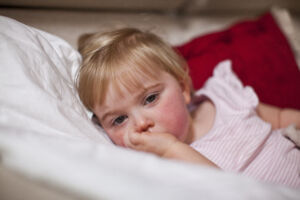News
Danish company abolishes children’s sick day limit
This article is more than 2 years old.
Norlys is confident the measure could increase staff loyalty, while industry expert believes it could make recruitment easier and eventually catch on with other employers

She should have stayed at home (photo: Charles Brewer/Flickr)
Your three-year-old woke up with an eye infection, but you successfully removed most of the gunk. Your five-year-old has a slight temperature, so there’s a danger he’s coming down with something, but surely he’ll survive the day – particularly if you give him a pill.
Working parents wake up to these kinds of dilemmas all the time: should they look after their kids at home so they don’t potentially infect others, or do they take them in and risk getting a telling off from the teaching staff?
It’s both a moral and financial dilemma; according to the law, every Danish worker has only two children’s sick days every year. Once they’ve used up their limit, they won’t be paid for any more days they take off.
It’s particularly problematic for employees who don’t have the option of working at home.
Relieves stress, increases loyalty and raises employee satisfaction
The energy group Norlys is the exception. Since March 1 it has been giving its employees an unlimited number of days off to look after their unwell children.
“It is a huge vote of confidence. We are happy and very proud,” one of its employees, Maria Østergaard, a mother of two young children, told DR.
“Many of my colleagues were stressed when one of the children was ill. For the sake of work, there were many – myself included – who dropped off a half-sedated child at daycare. It hurts. You get hit because you don’t think you’re doing well enough as a parent and that it’s not fair to your child.”
Agnete Lundemose, the HR manager at Norlys, is confident the measure will bring many benefits and won’t end up being a financial burden: “We believe that we will get more satisfied and less stressed employees, and we get something back the other way in the form of increased loyalty from the employees.”
Could the Norlys example inspire a rethink?
A labour market research expert at Aalborg University thinks more companies are likely to follow the example of Norlys – if the new provision is a success.
“Attracting skilled employees has a lot to do with being able to offer good conditions in the workplace – and this is a good example of that,” Professor Thomas Bredgaard told DR.
“If, for example, you cannot get more salary or other benefits, then you can put this proposal on the table.”










































